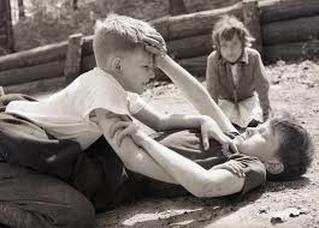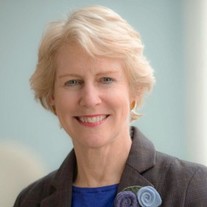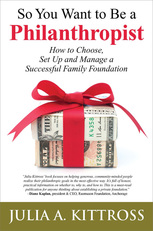 Help! My brother, sister, cousin, uncle, parents, grandparents, kids drive me crazy at our foundation meetings! I've seen it all. Brothers walking out in anger. Children feeling disenfranchised and depressed. Parents wanting to make all the decisions. Cousins wanting to quit if someone else doesn't. Why does this happen? Because family relationships are intense. They include long histories, differing generations, expectations, and responsibilities. You can avoid at least some of these problems by agreeing as a group how decisions will be made. Then, again as a group, develop decision-making criteria. Determine how much "homework" is needed, and who does it. Due diligence can be carried out by each member of the board, by certain members that have more time or expertise, or by someone you hire. Make sure everyone has a chance to talk at meetings. Create a set of rules that you post each time: For example, "No interruptions" or "Listen respectfully." For those who have a bad habit of interrupting, fine them $1 (or more!) to be collected for each interruption (use the money to pay for refreshments or add to a grant), or use a talking stick, or a carefully aimed Nerf® ball. (A former colleague of mine worked with a family foundation that placed their foam ball in a chalice in the board room!) Sometimes family dynamics become too difficult to handle and a dose of professional assistance may be needed. Foundations have split and families have developed schisms, all because people haven't agreed ahead of time what each trustee will do and how decisions will be made — and reviewed that process periodically to ensure it still works. —Julia
0 Comments
 "I’ve always said that when it comes to influencing your children to be charitable, it’s not what you say, it’s what you do. Guess what? I was wrong." Ellen Remmer of The Philanthropic Initiative just posted this statement above on TPI's blog, Deep Impact. Like Ellen, I've spent years suggesting to clients concerned about their children's philanthropic urges that they should teach by doing. I still think that's a good idea -- I know how my mother's philanthropic activities affected me, even as I sat at the back of the room coloring while she participated in meetings -- but the Women Give 2013 study Ellen sites is fascinating. Ellen wrote: "it found that children whose parents to talk to them about giving are 20% more likely to give than those whose parents don't. And it found that talking actually matters more than role-modeling when it comes to parents influencing their children’s philanthropic behavior." Well, show and tell, I guess! —Julia  By mid-September 2013, So You Want to Be a Philanthropist will be available on Amazon. This lively, jam-packed book will allow those thinking about setting up a family foundation to ask the questions they should — before they do. And for those with a foundation that isn't functioning as they'd hoped, this book can help get you back on the right track. I'm excited about your reactions and look forward to hearing what you think! — Julia  On the evening of May 21st, a limited number of philanthropists will meet at the Threshold Group's invitation to hear Maggie Walker, Laurel Nesholm and Molly Hanlon (Walker Family Foundation, Nesholm Foundation and Hanlon Family Foundation respectively) have a conversation about the various ways they have engaged the next generation in their family's philanthropy. I'm delighted to facilitate this discussion about "Igniting the Full Potential of Your Family in Philanthropy" and if you'd like to attend, please contact Katrin Dietz at the Threshold Group at (206) 748-3695 or at [email protected]. —Julia |
AuthorJulia Kittross: Archives
September 2017
Categories
All
|

Julia Kittross | Philanthropy Sherpas
[email protected] | www.PhilanthropySherpas.com | 206.334.7995
[email protected] | www.PhilanthropySherpas.com | 206.334.7995
 RSS Feed
RSS Feed